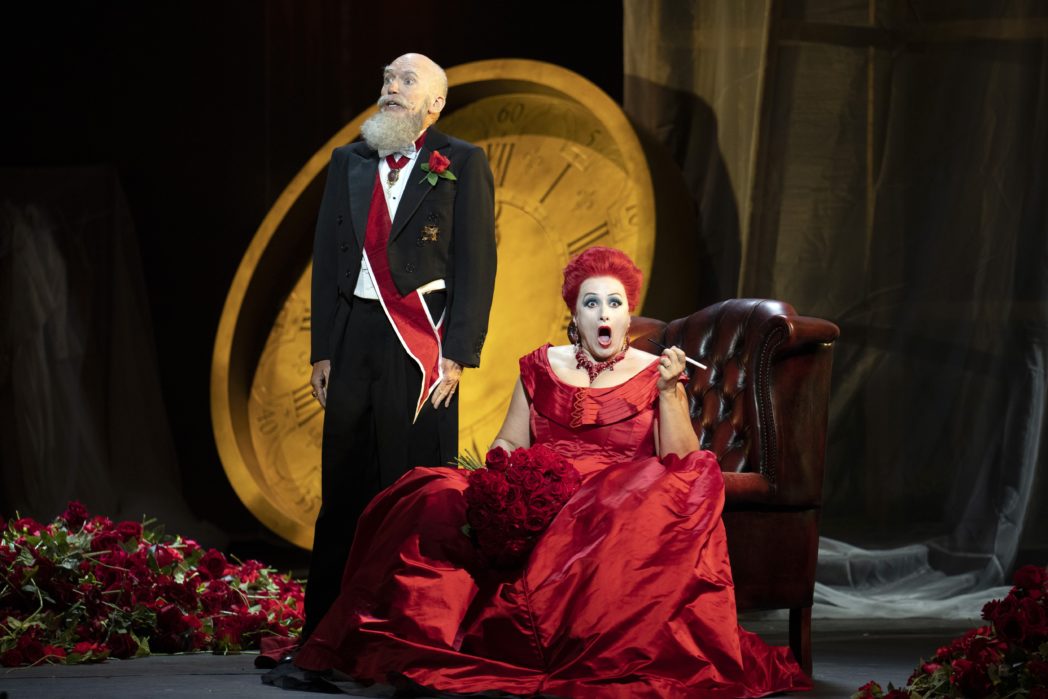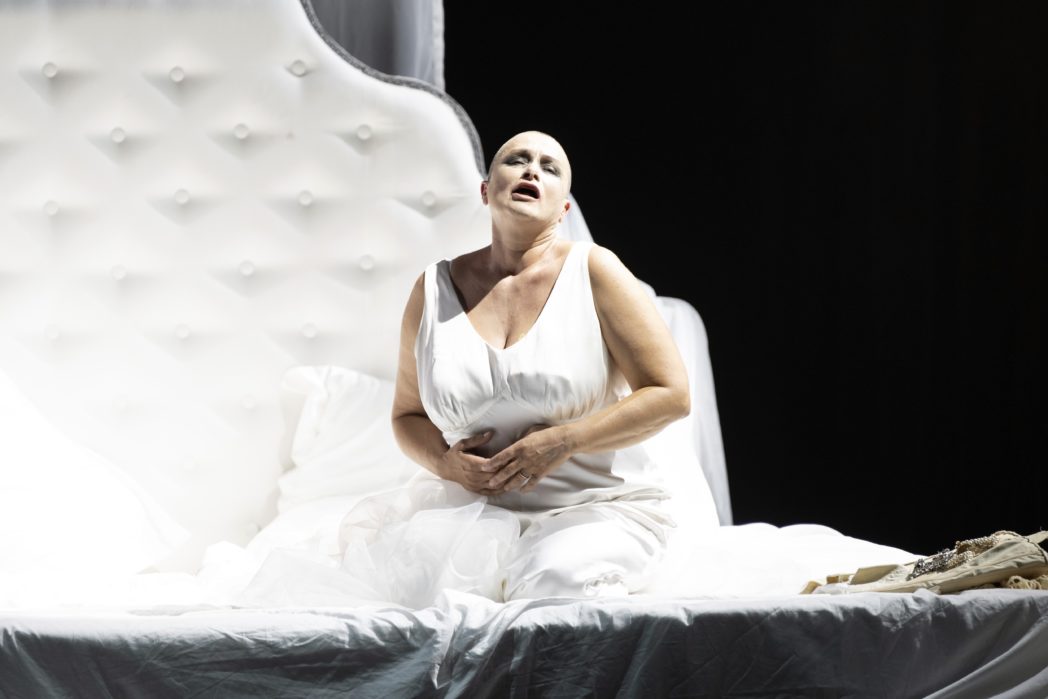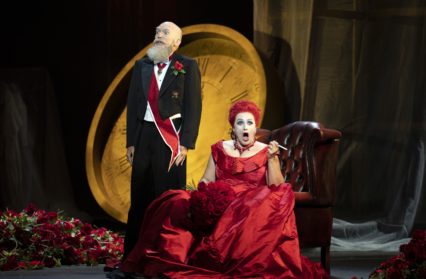Welsh National Opera‘s new production of The Makropulos Affair by Janáček sees the company open its Autumn season with power and precision. Nigel Jarrett was our man in Row F of the Wales Millennium Centre.
Not the least skilful exercise in The Makropulos Affair is how the composer deals with its central and complicated back story: a law suit involving the issue and inheritance claim associated with one of the protagonist’s previous love lives. Emilia Marty, a celebrated opera singer, is just the 1920s embodiment of a woman who has been living for 300 years. In the first act, Janacek tells the story through the tripping parlando of the lawyer Kolenatý in the presence of the woman herself, who interjects now and then. Kolenatý’s single-note progress sounds like an attorney totting up part of his fee though its rapidity is the antithesis of the slow convolution necessary for maximising it. Janacek gets it out of the way so that a procedural realism can make way for the magic kind, illustrated by Marty’s entry ‘in a strange light’, as the composer’s own stage direction has it. No strange light in Olivia Fuchs’s new production for WNO, a joint one with Scottish Opera, but an upward fluttering of legal documents as though, mutatis mutandis, a vixen had entered the hen house.
Fuchs’s bolt-lightning and visceral production, conducted by Tomáš Hanus without let up but with an instinctive feeling for nuance, makes room for wit, of which the opera has little. The strange light comes right at the start as a battery of high-voltage beams pointed at the audience is switched on for a couple of seconds as if to wake it up for what’s to follow. Mark Le Brocq, playing the solicitor Vitek, steps in front of the curtain in the intermission between the first two acts to explain the plot for ‘anyone in the audience who doesn’t speak Czech’. It’s an amusing, if self-conscious, take on any opera performed in a foreign language with a wordy narrative swimming in music. Marty’s further elaboration comes in the final act: it’s part dramatic irony, as only she knows her life-history. The suit has arisen from her early 19th-century manifestation as another singer, the Scottish Ellian MacGregor (also another ‘E.M.’) and the illegitimate son whose surname she entered in the register as ‘Makropulos’, a reference to her 16th-century Habsburg origins: she was the daughter of a court physician who on pain of imperial retribution compelled her to drink the elixir he’d concocted.

Spanish soprano Ángeles Blancas Gulin as Marty is astonishing. She holds nothing back once the character, at last becoming human, realises her colourful triple century may be over. Marty is pursued throughout by the litigants and their representatives with no less fervour as they seek an outcome lodged in the present. But it’s Marty’s long life that unravels, its ghostliness adumbrated by Sam Sharples’s tasteful back-projected videos, in which timepieces tick inexorably in the same way as clocks preside over the legal wrangling on Nicola Turner’s literal but effective sets. The pursuit is no less ardent in the attentions of Marty’s demented former lover Hauk-Šendorf (an excellent Alan Oke), himself forever stalked by people in white coats. Titters run through the audience as defending litigant Baron Prus, played determinedly by David Stout, attempts to have his way with a frigid Marty in exchange for the document that will tell all about the potion her father had invented. (Why does this sort of thing on stage still embarrass some of us? And why do theatre directors think it necessary to enact the obvious as though it were essential?)
In a slightly corny coup de théatre Marty pulls down a huge white shroud on to what is now her death bed; it seems to imprison her in the mists of the past, from which she’ll not recover. Almost everyone has followed her into the bedroom. Contributing to a performance whose strength is in its ensemble playing are Nicky Spence (the unsuccessful plaintiff Albert Gregor), Harriet Eyley (Vitek’s daughter Krista, in thrall to Marty), and Alexander Sprague (Janek, Prus’s son and Krista’s suitor). Incidentally, Gustáv Beláček as Kolenatý is the only Czech singer in the cast, which not for the first time – Janáček operas are a WNO speciality – deals effortlessly with the language. Julia Daramy-Williams, Dafydd Allen, and Monika Sawa play their smaller roles with conviction and the men of the WNO Chorus also get a look in offstage. Robbie Butler’s lighting is always in the right place at the right time.

The Makropulos Affair is fast-moving and heady; the audience is pulled along by an orchestration that’s like a livid forest of sounds on which the sun doesn’t set till very late in the day and by vocal parts that are always impassioned and imploring. As with the play by Karel Čapek on which the composer based his libretto, one questions what Marty represents. The perennial trope in art, incorporating cure-alls and Faustian pacts, is always fascinating, not least in terms of what eternal life means to its recipients. Fuchs understands the tensions inherent in that prospect. There’s a vague sense that Marty, as an immediately post-war creation, is a symbol of Habsburg vestige, of fading Empire that thought it would live forever. But that’s surmise. The opera, despite the complexities of plot that threaten to clog in its branches, is a dramatic roller-coaster, not a note of music wasted, not a narrative twist out of place. As a febrile living thing it ends as it must, and WNO has the measure of it.
You may also like…
Jenůfa: Janáček | Welsh National Opera
Welsh National Opera continues its Spring season with the revival of Janáček’s Jenůfa – a scintillating production from the 1990s. Nigel Jarrett was at the first night.
Nigel Jarrett is a winner of the Rhys Davies Prize and the Templar Shorts Award, both for short fiction. His sixth book, a fictional memoir, is Notes From the Superhorse Stable. It appeared this year from Saron Publishers. His fourth story collection, Five Go to Switzerland, will be published this autumn by Cockatrice Books. Jarrett, a former daily-newspaperman, is now a freelance arts critic and writes for Wales Arts Review, Acumen poetry magazine, Jazz Journal and several others. He lives in Monmouthshire and he swims a lot.
All Photographs Courtesy of Richard Hubert-Smith
Welsh National Opera



 Enjoyed this article? Support our writers directly by buying them a coffee and clicking this link.
Enjoyed this article? Support our writers directly by buying them a coffee and clicking this link.








